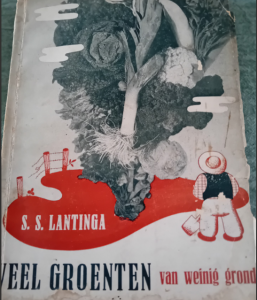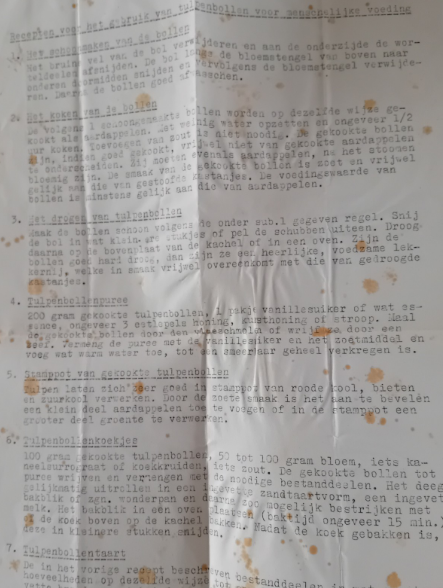Tulip bulbs can be eaten, but it is not a common source of human food. Eating tulip bulbs helped many Dutch people in the Hunger Winter, the last winter of the Second World War (1944-1945). During the German occupation the Dutch suffered from a shortage of food. In the collection of my mother, I found a short book published in 1941 with a made-do-and-mend approach about growing your own food. My mother died this summer at the age of 92.
The book ‘Veel groenten van weinig grond’ (in Dutch: Many vegetables from little soil) gives advice to readers on how to grown vegetables in small plots of land, gardens, etc. This book in the first year of the occupation does not mention the use of tulips as food. Hidden in the book was a typed one-page sheet with three instruction for tulips followed by five recipes. 
The main message seems to be that the preparation of the tulip bulbs as well as the taste is very much like potatoes. For example, the recipe for tulip bulb puree includes boiling the bulbs, one packet of vanilla sugar or vanilla essence, three spoons of honey, artificial honey or syrup, mix well and add warm water.
Prof. Edwin van Teijlingen
Faculty of Health, Environment & Medical Sciences











 REF Code of Practice consultation is open!
REF Code of Practice consultation is open! BU Leads AI-Driven Work Package in EU Horizon SUSHEAS Project
BU Leads AI-Driven Work Package in EU Horizon SUSHEAS Project Evidence Synthesis Centre open at Kathmandu University
Evidence Synthesis Centre open at Kathmandu University Expand Your Impact: Collaboration and Networking Workshops for Researchers
Expand Your Impact: Collaboration and Networking Workshops for Researchers ECR Funding Open Call: Research Culture & Community Grant – Apply now
ECR Funding Open Call: Research Culture & Community Grant – Apply now ECR Funding Open Call: Research Culture & Community Grant – Application Deadline Friday 12 December
ECR Funding Open Call: Research Culture & Community Grant – Application Deadline Friday 12 December MSCA Postdoctoral Fellowships 2025 Call
MSCA Postdoctoral Fellowships 2025 Call ERC Advanced Grant 2025 Webinar
ERC Advanced Grant 2025 Webinar Update on UKRO services
Update on UKRO services European research project exploring use of ‘virtual twins’ to better manage metabolic associated fatty liver disease
European research project exploring use of ‘virtual twins’ to better manage metabolic associated fatty liver disease